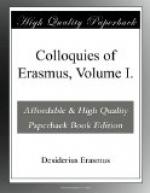Ch. I never heard any Thing more to the Purpose from a Poet. You deserve to drink out of a Cup set with Jewels. Boy, take away this Dish, and set on another.
Au. You have got a very clownish Boy.
Ch. He is the unluckiest Knave in the World.
Au. Why don’t you teach him better Manners?
Ch. He is too old to learn. It is a hard matter to mend the Manners of an old Sinner. An old Dog won’t be easily brought to wear the Collar. He’s well enough for me. Like Master like Man.
* * * * *
If I knew what you lik’d, I would help you.
Au. I would cut you a Slice, if I knew what would please you. I would help you, if I knew your Palate. I would help you, if I knew what you lik’d best. If I knew the Disposition of your Palate, I would be your Carver. Indeed my Palate is like my Judgment.
Ch. You have a very nice Palate. No Body has a nicer Palate than you have. I don’t think you come behind him of whose exquisite Skill the Satyrist says,
Ostrea callebat
primo deprendere morsu,
Et semel aspecti
dicebat littus echini.
Au. And you, my Christian, that I may return the Compliment, seem to have been Scholar to Epicurus, or brought up in the Catian School. For what’s more delicate or nice than your Palate?
Ch. If I understood Oratory so well as I do Cookery, I’d challenge Cicero himself.
Au. Indeed if I must be without one, I had rather want Oratory than Cookery.
Ch. I am entirely of your Mind, you judge gravely, wisely, and truly. For what is the Prattle of Orators good for, but to tickle idle Ears with a vain Pleasure? But Cookery feeds and repairs the Palate, the Belly, and the whole Man, let him be as big as he will. Cicero says, Concedat laurea lingae; but both of them must give place to Cookery. I never very well liked those Stoicks, who referring all things to their (I can’t tell what) honestum, thought we ought to have no regard to our Persons and our Palates. Aristippus was wiser than Diogenes beyond Expression in my Opinion.
Au. I despise the Stoicks with all their Fasts. But I praise and approve Epicurus more than that Cynic Diogenes, who lived upon raw Herbs and Water; and therefore I don’t wonder that Alexander, that fortunate King, had rather be Alexander than Diogenes.
Ch. Nor indeed would I myself, who am but an ordinary Man, change my Philosophy for Diogenes’s; and I believe your Catius would refuse to do it too. The Philosophers of our Time are wiser, who are content to dispute like Stoicks, but in living out-do even Epicurus himself. And yet for all that, I look upon Philosophy to be one of the most excellent Things in Nature, if used moderately. I don’t approve of philosophising too much, for it is a very jejune, barren, and melancholy Thing. When I fall into any Calamity or Sickness, then I betake myself to Philosophy, as to a Physician; but when I am well again, I bid it farewell.




